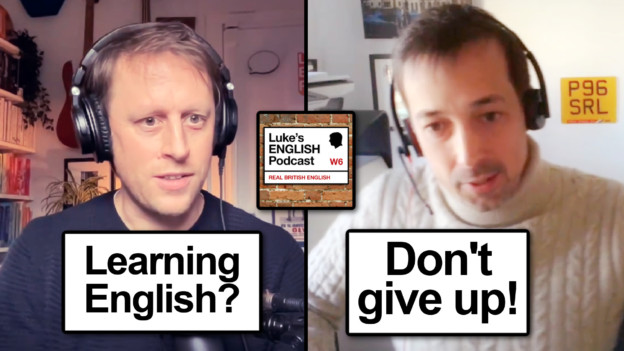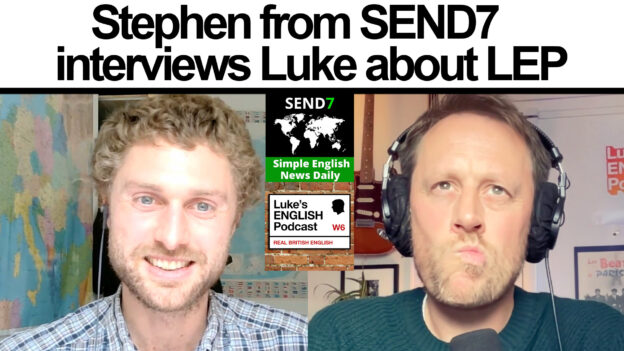A conversation with Anna Tyrie from English Like a Native (YouTube, Podcast) about children, the way we talk to children, and vocabulary relating to children and childcare, and some special news from the Thompson family…!
👉 Anna interviews Luke on her podcast https://www.buzzsprout.com/2038858/12353084
Introduction Transcript
Hello, welcome back to LEP.
Here is another episode with more English listening practice for you to get stuck into, and I have another guest on the show today.
This time it is Anna Tyrie from English Like a Native, the channel on YouTube. You might also know her from Instagram and TikTok.
Anna has recently set up a podcast too, which you can find wherever you get your podcasts. It’s called the English Like a Native Podcast.
In fact, on the same day we recorded the conversation for this episode of my show, Anna also interviewed me for her podcast and we had a good long conversation about all sorts of things. It was very nice to be interviewed by her. You should be able to find that episode on her show now. So if you enjoy this one, go ahead and listen to the one on Anna’s podcast too. You will find a link in the description 👆.
In this conversation: Get to know Anna a bit and talk a bit about her podcast and youtube channel and what the name really means.
The main subject – talking about children. We decided that we could talk about a particular topic for this episode and that topic ended up being children. I’ve had requests from listeners in the past for more on the subject of children and the English language, including the way we talk to children, the way we talk about children and the specific words for lots of things related to children.
We talk about our own kids, and specifically about how we communicate with them, typical things we say to them (in English of course), how we should be careful about the things we say to our kids, the ways adults adapt their English when talking to little children, including examples of so-called “baby talk” or “parentese” and then there is a sort of quiz at the end with questions about specific English words for lots of the different objects, toys and bits of useful equipment that we use with babies and little kids.
As you know I have a daughter and she is 5 so a lot of that baby stuff almost seems like a distant memory now, but, well, it’s high time I remembered all of that vocab again now because – drum roll… yes, my wife is pregnant again and we going to have another baby!
Yes we are delighted.
Thank you – because at this moment of course you are now saying…
“Wow, that’s fantastic! Congratulations! I’m so happy for you!” and then all the typical questions will come to mind, including:
- Can I ask when the baby is due?
- Do you know if it’s a boy or a girl? Would you like to know?
- Are you ready?
- Do you have any ideas for names?
- How’s your wife doing, is she ok?
- How does your little daughter feel about it? Is she excited?
Etc.
I’m sure I’ll talk about it again in another podcast, but I thought I would let you know now.
Of course the child hasn’t even been born yet, so there’s a long way to go.
But all being well, in July there will be a new Thompson arriving 😊
I don’t know how that will affect the podcast.
Of course it’s probably going to disrupt things to some extent as I will be busy at home, with my wife, looking after the baby, helping my wife with anything if she needs it, taking care of our daughter, trying to keep things ship shape and under control and generally just being at home focusing on the family.
So I won’t be able to do much podcasting around the time of the birth and in the weeks after. Who knows, maybe I’ll disappear completely for July and August, or maybe I’ll find a way to keep podcasting.
Maybe, if I’m organised and industrious enough, by the time the baby arrives I will have recorded lots of episodes beforehand, which I will be able to publish over the summer, or maybe I’ll dig into my archives for some unpublished or lesser-known material, which a lot of people haven’t heard – like app-only episodes from the LEP App (which is now defunct by the way).
In any case, there might be some kind of disruption to the show. Thank you for your understanding and your patience and your lovely messages of congratulations and support, which you are welcome to write to me.
Obviously, I’ve just said thank you for a thing you haven’t even done yet, which is kind of against the rules, but anyway. There it is. We’re very happy. We’re hoping everything goes well. I’ll probably talk about it a bit more in another episode later on.
So, now let’s get back down to earth here because this is a conversation with Anna from English Like a Native, getting to know Anna a bit and then talking about the English which we use with kids, about kids and for all the bits and pieces involved in looking after kids.
By the way, this conversation was recorded in January, which is why I say “It’s January” at the start. I probably didn’t need to say this, did I? You probably have the deductive skills to work out that when I say to Anna “it’s January” it’s because we recorded that in January. But just in case you were worried that I don’t know what month it is, don’t worry, I do know what month it is, what year it is and generally where I am and what’s going on. OK, fine.
I will speak to you a bit again at the end, but now let’s get started with the interview right now.
Ending Transcript / Notes
Thanks again to Anna.
You can find a vocabulary list and notes on the page for this episode on my website if you want to check specific words.
A reminder – after recording this, Anna interviewed me on her podcast and as I said earlier we had a good long conversation about lots of things, with little stories and jokes and stuff. A long conversation. I think it was even longer than the one you just listened to. I’m wondering how Anna is going to deal with that, but you can find out for yourself by listening to that episode on Anna’s podcast- English Like a Native, which is available wherever you get your podcasts.
Thanks for listening everyone.
Have a lovely day, morning, evening or night etc. Goodbye!
Vocabulary Lists
Baby-talk in English
Examples of baby talk in English
- Cutie-pie
- Sweetie-pie
- Munchkin
- Cheeky-monkey
- Wee / Wee-wee / pee / pee-pee
- Poo / poo-poo
- Potty
- Dog / doggy
- Cat / kitty
- Jim-jams
- Beddy-byes
- Nighty-night
- Sleepy-time
- Nap-time (do-do)
- Blankie
- Din-dins
- Ickle (little)
- Icky – disgusting
- Bedtime stories / Story time
- Tummy / Belly
- Oopsy-daisy
- Mama
- Mummy / Daddy
- Uncle Jamie
- Grannie / Grandad
- Yuk / yukky
Common words and phrases relating to babies/children/childcare
This list includes words and phrases which came up in the quiz.
- Activity arch / baby arch / arch toy
- Baby bouncer (like a small deck chair)
- Baby carrier / sling
- Baby jumper
- Baby fence / play-pen / baby-gate
- Baby monitor
- Baby-grow (a one-piece outfit that babies wear)
- Bib (to catch or protect against food that falls while they eat)
- Blanket (a lot of children have a special blanket that they use as a comforter)
- Bottle (for milk)
- Breast pump (a device which allows the mother to pump her milk into a bottle)
- Changing mat (where you change the baby’s nappy)
- Cot (where the baby sleeps – a bed with high sides so the baby doesn’t crawl out of bed)
- Drool bib (to absorb drool which comes out of the baby’s mouth when teething)
- Dummy / pacifier (what the baby sucks while sleeping)
- Flannel (an absorbant cloth)
- High-chair (what the baby sits in while eating)
- Mobile (the thing that hangs above the bed and gives the baby something to look at)
- Nappy (US English: diaper)
- Powdered milk
- Pram / pushchair (UK) buggy / stroller (US)
- Pyjamas
- Rattle (a toy that the baby can shake to make a rattling noise)
- Talcum powder / talc (powder which can be put on the baby’s bum to keep it dry)
- Teddy bear / stuffed toy
- Teether / Teething toy(for teething babies) (something the baby can chew while the teeth come through)
- Thermometer (to check the baby’s temperature)
- Wipes (to wipe up the… mess)









